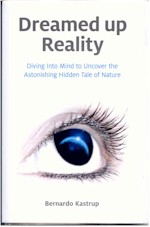 |
|
|
| ||||||
|
|
This page is the original source of this review, though you may also find it on Amazon or other sites. | ||
| Book Reviews Home | Free Audio Books | |
 |
Book Review of: Dreamed Up RealityDiving into the mind to uncover the astonishing hidden tale of nature Price: $14.58 Availability: Usually ships within 24 hours |
| Review of
Dreamed Up Reality, by Bernardo Kastrup (Softcover, 2011) (You can print this review in landscape mode, if you want a hardcopy) Reviewer: Mark Lamendola, author of over 6,000 articles. The author is very clear from the outset that this isn't one of those books that grossly misrepresents quantum physics by claiming it explains psychic forces. He does, however, draw on his quantitative background and analysis skills to examine his own journeys into the deep subconscious or deep meditative states. The journeys are experiments of his own design, and there are four of them. An interesting aspect of this is he also uses computer simulations. In fact, the Appendix provides algorithms written in the code language Processing (based on Java). He compares his visualizations and impressions with the known universe and the laws that govern it. The analysis is a bit deep, so the reader needs to pay careful attention while walking through it. A particularly interesting idea he brings up is that we have knowledge that's outside our brains. This needs a bit of explanation. One theory is that everything we know is "downloaded" into our minds. That it is, we read it or hear it, or in some way get it from some source. Kastrup doesn't point out the fact that we can generate our own information, for example as Einstein did via thought experiments. But he does take us in another direction, that being we can connect to an outside source.
This idea isn't new. It's even been popularized in our culture, which becomes obvious shortly into any of the Star Wars films. One thing Kastrup adds is how to get into a mental state in which that information becomes accessible. How, for example, do you get around the mind's own filters? Fractals figure heavily in this book, as do mandalas (especially Tibetan mandalas). If you're interested in mind exploration, this book would be a good addition to your library. One thing I didn't like about the book is the small typeface. Going the next size up for any reprints would be a welcome improvement. This book consists of 13 chapters in 162 pages, plus 17 pages of computer code, plus 10 pages of endnotes. | |
About these reviewsYou may be wondering why the reviews here are any different from the hundreds of "reviews" posted online. Notice the quotation marks? I've been reviewing books for sites like Amazon for many years now, and it dismays me that Amazon found it necessary to post a minimum word count for reviews. It further dismays me that it's only 20 words. If that's all you have to say about a book, why bother? And why waste everyone else's time with such drivel? As a reader of such reviews, I feel like I am being told that I do not matter. The flippancy of people who write these terse "reviews" is insulting to the authors also, I would suspect. This sound bite blathering taking the place of any actual communication is increasingly a problem in our mindless, blog-posting Webosphere. Sadly, Google rewards such pointlessness as "content" so we just get more if this inanity. My reviews, contrary to current (non) standards, actually tell you about the book. I always got an "A" on a book review I did as a kid (that's how I remember it anyhow, and it's my story so I'm sticking to it). A book review contains certain elements and has a logical structure. It informs the reader about the book. A book review may also tell the reader whether the reviewer liked it, but revealing a reviewer's personal taste is not necessary for an informative book review. About your reviewer
About reading styleNo, I do not "speed read" through these. That said, I do read at a fast rate. But, in contrast to speed reading, I read everything when I read a book for review. Speed reading is a specialized type of reading that requires skipping text as you go. Using this technique, I've been able to consistently "max out" a speed reading machine at 2080 words per minute with 80% comprehension. This method is great if you are out to show how fast you can read. But I didn't use it in graduate school and I don't use it now. I think it takes the joy out of reading, and that pleasure is a big part of why I read. |
| |||||